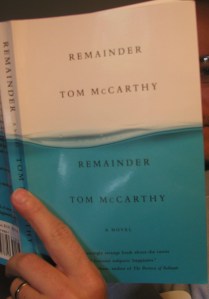 What a trip! This book moved so fast, and yet, it was very slow at the same time. The first thing that struck me was how very depressed I felt reading it. It was impressive how the author, Tom McCarthy, managed in so few very words managed to instill such a depressive attitude upon me. I think I actually caught myself exhaling in a sigh at several points in the beginning reading agonizing descriptions of a man caught between two decisions and literally walking back and forth in a seemingly endless loop in a street, to the full dismay of shop keepers and other passersby.
What a trip! This book moved so fast, and yet, it was very slow at the same time. The first thing that struck me was how very depressed I felt reading it. It was impressive how the author, Tom McCarthy, managed in so few very words managed to instill such a depressive attitude upon me. I think I actually caught myself exhaling in a sigh at several points in the beginning reading agonizing descriptions of a man caught between two decisions and literally walking back and forth in a seemingly endless loop in a street, to the full dismay of shop keepers and other passersby.
The bottom of the cover, I don’t know if you can see it here or not, but the bottom of the cover has a quote on it from a reviewer who says that the book is about “the rarest of fictional subjects: happiness.” Which makes an incredible statement about subjectivity. Because in no way, shape, or form could I be happy in the same way as this man was happy. The man in this book. He was injured in an accident. He received a lot of money by way of compensation. But he didn’t want money and he didn’t really know what to do with it once he got it. He even says at one point that all the typical courses of action for a person who comes into serious money held absolutely no interest for him.
It was very interesting to me, in the beginning of the book, as he described the painstaking process by which he recovered some of his motor function lost in the accident. He talks about how the neural pathways in his brain that allowed him to perform some basic functions were gone. And he had to learn new neural pathways. To do this, he used the example of picking up a carrot, his P.T. had him imagine the carrot, imagine his hand, imagine all the muscles in his hand, all the bones. Imagine how each worked together, how each worked independant of one another. How each would work in order to pick up a carrot. Eventually he imagined his own hand reaching out and picking up the carrot. He imagined this in his head enough times that one time, while imagining it, his hand simply did it. Just did it. And boom, he’s done. New neural pathway carve out, no more work necessary.
And essentially that’s what he does throughout the rest of the book – his re-enactments – he imagines things enough times through them that they happen and become a new kind of reality. And in that reality he finds happiness. ( preserve me!) But in the end, no matter how hard he tried to imagine, no matter how many practices he held, no matter how much he had something re-enacted, he discovered that it could exist out of the second reality he created. If he tried to impose the new relaity (the new neural pathway) on the old, it wouldn’t quite fit. And it all went wrong. Because when you re-enact a bank robbery in a real bank, with real bank tellers, with real customers, using real guns, and it goes wrong, you can’t just call “scene” and start over. Maybe that’s what he wished he could do with his life. Call “scene” and start again, before the accident. But of course, he couldn’t.
And what’s with the title? Never does the word “remainder” get used. Once, there was a discussion fo synonyms of “remainder,” but they never get around to saying it. Like it was somehow out of reach, right on the tip of the tongue but not there. Is that what he’s saying about happiness? Or is this book even about happiness? Maybe the guy on the cover got it wrong. Maybe it’s about what’s left over – residual – after we’ve tried to achieve happiness every other way, every other neural pathway to it. In which case, if it’s about happiness, it leaves you about as satisfied as eating a whole, plain avocado. But if it’s about something else, why then, it’s like eating an avocado with salt.
I enjoyed reading this book a lot. It went fast. It was entertaining. It wasn’t particulaly suspenseful and I found that until the end, I was even a little bored cause I kept guessing the next step. I enjoyed reading it, but I’m not sure I enjoyed it. But I’d recommend it.